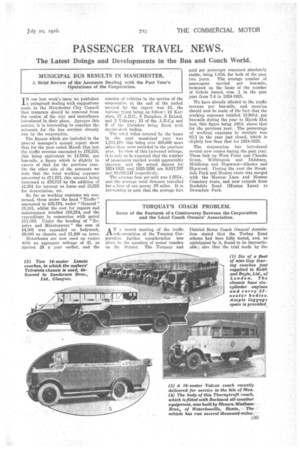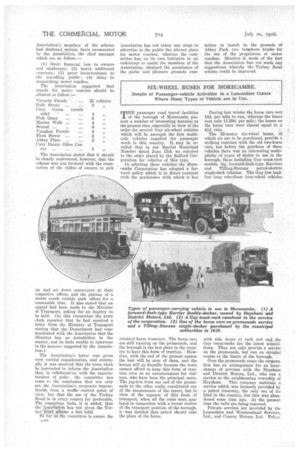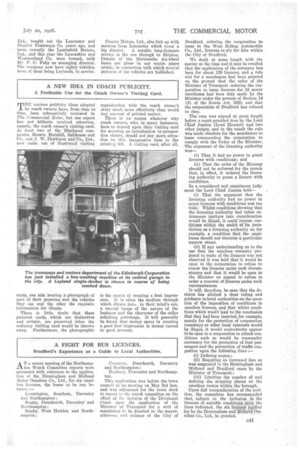PASSENGER TRAVEL NEWS.
Page 23

Page 24

Page 25

If you've noticed an error in this article please click here to report it so we can fix it.
The Latest Doings and Developments in the Bus and Coach World.
MUNICIPAL BUS RESULTS IN MANCHESTER.
A Brief Rev:ew of the Accounts Dealing with the Past Year's Operations of the Corporation.
IN our last week's issue we published a paragraph dealing with suggestions made to the Manchester City Council that tramcars should be removed from the centre of the city and motorbuses introduced in their place. Apropos this matter, it is interesting to consider the accounts for the bus services already run by the corporation.
The figures which are included in the general manager's annual report show that for the year ended March 31st last the traffic revenue amounted to 176,534, this being equivalent to 13.796d. per bus-mile, a figure which is slightly in excess of that for the previous year. On the other side of the accounts we note that the total working expenses amounted to 171,572, this amount being increased to £76.718 by the addition of 11,591 for interest on loans and £3,555 for depreciation, etc.
So far as working expenses are concerned, those under the head "Traffic" amounted to £35,774, under " General " £8,161, whilst the cost for repairs and maintenance totalled £16,254, and the expenditure in connection with petrol 111,383. Under the heading of "Repairs and Maintenance" the sum of 14,502 was expended on bodywork, £9,880 on chassis, and £1,400 on tyres.
Motorbuses are now used on routes with an aggregate mileage of 41, as against 28 a year earlier, and the number of vehicles in the service of the corporation at the end of the period covered by the report was 51, the various types being as follow: 18 Karriers, 17 A.E.C., 8 Daimlers, 6 Bristol, and 2 Vulcans; 15 of the A.B.C.s and 6 of the Daimlers being fitted with doable-deck bodies.
The total miles covered by the buses in the past municipal year was 1,331,470, this being over 400,000 more miles than were recorded in the previous year. In view of this increased mileage, it is only to be expected that the number of passeugers carried would appreciably increase, and the actual figures for 1924-1925 and 1925-1926 are 6,917,707 and 10,050,147 respectively.
The average fare per mile was 1.257d., and the average total distance travelled for a fare of one penny .79 miles. It is interesting to note that the average fare paid per passenger remained absolutely stable, being 1.83d. for both of the past two years. The average number of passengers carried per bus-mile, reckoned on the basis of the number of tickets issued, rose .1 in the past year from 7.4 in 1924-1925.
We have already alluded to the traffic revenue per bus-mile, and mention should now be made of the fact that the working expenses totalled_12.901d. per bus-mile during the year to March 31st last, this figure being .041d. above that for the previous year. The percentage of working expenses to receipts was 93.3 in the year just closed, which is slightly less than that for 1924-1925.
The corporation has introduced several new routes during the past year. These link up West Point and Cheadle Green, Withington and Didsbury, Middleton and Hopwood—Rhodes and Hepwood. During the year the Brookdale Park and Moston route was merged with the Moston Lane and Moston Cemetery route, and now extends from Rochdale Road (Moston Lane) to Broosdale Park.
TORQUAY'S COACH PROBLEM.
Some of the Features of a Controversy Between the Corporation and the Local Coach Owners' Association.
AT a recent meeting of the traffic sub-committee of the Torquay Corporation further consideration was given to the question of motor coaches on the Strand. The Torquay and
District Motor Coach Owners' Association stated that the Torbay Road scheme had been fully tested, and, as anticipated by it, found to be impracticable; also that the trial made by the Association's members of the scheme bad discloseJ certain facts enumerated by the AssoCifition, the chief amongst which are as follow :—
(1) Great financial loss to owners and employees ; (2) heavy additional expenses ; (3) great inconvenience to the travelling public ; (4) delay in despatching motor coaches.
The Association suggested that stands for motor coaches should be
up and set down passengers at their respective offices, and the placing of a motor coach outside such offices for a reasonable time. It also stated that an appeal bad been made to the Minister of Transport, asking for an inquiry to be held. .(In this connection the town clerk reported that he had received a letter from the Ministry of Transport stating that the Department had communicated with the Association that the Minister has no jurisdiction in the matter, and he feels unable to intervene in the manner suggested by the Association.) The Association's letter was given very careful consideration, and eventually it was resolved that the town clerk be instructed to inform the Association that, in collaboration with the superintendent of polic the, committee has come to the conclusion that not only are the Association's proposals impracticable from a traffic control point of view, but that the use of the Torbay Road is in every respect far preferable. The. committee feels, it is added, that the 1ssaf:40bn has not given the Torba;‘'T.finfl:Sehe,ine a fair trial. gO 'far WS. the committee is aware the c40
Association has not taken any steps to advertise to the public the altered place for motor coaches, whereas the committee ha; on its own initiative in an endeavour to assist the members of the Association, obtained the permission of the parks and pleasure grounds cotn
mittee to install in the grounds of Abbey Park two telephone kiosks for the use of the proprietors of motor coaches. Mention is made of the fact that the Association has not made any suggestions whereby the Torbay Road scheme could be improved.
THE passenger road travel facilities of the borough of Morecambe present a number of interesting features at the present time, especially in view of the order for several Guy six-wheel vehicles which will be amongst the first multiaxle vehicles supplied for passenger work in this country. It may be recalled that in our Special Municipal :Number dated June 15th we referred to the order placed by the Salford Corporation for vehicles of this type.
In selecting these vehicles the Morecambe Corporation has adopted a forward Policy which is in direct contrast with the persistence with which it has
retained horse tramcars. The horse cars are still running on the promenade, and the borough is the last place in the country to have this form of traction. However, with the end of the present season the last will be seen of them, and the horses will go literally because the town cannot afford to keep this form of traction even as an entertainment for visi; tors, who have been the principal users. The jog-trot from one end of the promenade to the other really constituted one of the amusements of the resort, but in view of the expense of this form cf transport, when all the costs were analysed in connection with a recent review of the transport position of the borough, it was decided that petrol should take the place of the horse.
During last winter the horse cars cost 18d. per mile to run, whereas the buses cost only 11.29d. per sails; the losses on the horse ears were almost equal to a 41d. rate.
The 52-seater six-wheel buses, of which six are to be purchased, provide a striking contrast with the old two-horse ears, but before the purchase of these vehicles there was an interesting multiplicity of types of motor in use in the borough, these including Guy toast-rack models, big forward-dash-type Karriers and Tilling-Stevens petrol-electric single-deck vehicles. The Guy low loadline long wheelbase four-wheel vehicles
with side doors at each end and ,the Guy toast-racks are the latest acquisitions. They not only provide a service on the promenade, but run on circular routes to the limits of the borough.
Over the promenade route the corporation has an arrangement for an interchange of services with the. Heysham and District Motors, Ltd, who run a service to the neighbouring township of Heysham. This company maintain a service whiCh was formerly provided by a petrol tramway, the only one of its kind in the country, but this was abandoned some time ago. At the present time the rails are being removed.
Private services are provided by the Lancashire and Westmorland Services, Ltd., and County Motors, Ltd. Fabys, ad., bought out the Lancaster and District Tramways Co. years ago, and more recently the Latiabsfield Motors, Ltd., and this year the Lancashire and Westmorland Co. were formed, with Mr. F. C. Maly as managing director. The company now have eighty vehicles, most of them being Leylands, in service. County Motors, Ltd., also link up with services from Lancaster which cover a big district. A notable long-distance service is the one through to Skioton., Details of the Morecambe six-wheel buses are given in our centre pages article, in connection with which several pictures of the vehicles are 'Published.
A NEW IDEA IN COACH PUBLICITY.
A Profitable Use for the Coach Owner's visiting Card.
MEM various publicity ideas adopted
by coach owners have, from time to time, been exhaustively reviewed in The C ommercial Motor, but one aspect has not hitherto received attention, namely, the coach owner's visiting card. At least two of the Blackpool companies, Messrs. Horsfall, Salthouse and Co.. mid .T. W. Dewhurst and Co., Ltd., now make use of illustrated visiting
cards, one side bearing a photograph of part of their premises and the vehicles they use and the other the requisite information for clients.
There is little doubt that these pictorial cards, which are distinctive and artistic, are preserved when the ordinary visiting card would be thrown away. Furthermore, the photographic reproduction tells the coach owner's story much more effectively than would any amount of printed matter.
• There is no reason whatever why coach owners, who, in many instances, have to depend upon their visiting card for securing an introduction to prospective clients, should not pay more attention to this inexpensive item in the printing bill. A visiting card, after all, is the means of creating a first impression. It is often the medium through which clients form, in their mind's eye, a mental image of the nature of the business and the character of the caller soliciting patronage. It Will generally be found that money spent in creating a good first impression is money turned to good account.
A FIGHT FOR BUS LICENCES.
Bradford's Experience as a Guide to Local Authorities.
AT a recent meeting of the Northampton Watch Committee reports were presented with reference to the application of the Birmingham and Midland Motor Omnibus Co., Ltd., for six omnibus licences, the buses to be run between :
Leamington, Southern, Daventry and Northampton ; Rugby, Dunchurch, Daventry and Northampton; Rugby, West Haddon and Northmnpton ; Coventry, Dunchurch, Daventry and Northampton; Banbury, Towcester and Northampton.
This application was before the town council at its meeting on May 3rd last, and was adjourned for the town clerk to report to the watch committee on the effect of the decision of the Divisional Court upon the application of the Minister of Transport for a writ of mandamus to be directed to the mayor, aldermen and citizens of the City of Bradford, ordering the corporation to issue to the West Riding Automobile Co., Ltd., licences to ply for hire within the City of Bradford.
We dealt at some length with the matter at the time and it may be recalled that the application of the company has been for about 120 licences, and a rule nisi for a mandamus had been granted on the ground that the order of the Minister of Transport ordering the corporation to issue licences for 18 motor omnibuses had been duly made by the Minister under the powers of Section 14 (3) of the Roads Act, 1920, and that the corporation of Bradford has refused to obey.
The ease was argued at great length ' before a court presided over by the Lord Chief justice (Lord Hewart) and two other judges, and in the result the rule was made absolute for the mandamus to ' issue commanding the corporation to comply with the Order of the Minister. The argument of the licensing authority was
(1)That it had no power to grant licences with conditions; and (ii) That the order of the Minister should not be enforced far the reason that, in effect, it ordered the licensing authority to grant a licence with conditions.
In a considered and unanimous judgment the Lord Chief Justice held
(i) That the argument that the licensing authority had no power to grant licences with conditions was too wide. Whilst conditions showing that the licensing authority had taken extraneous matters into consideration would be illegal, it could impose conditions within the ambit of its jurisdiction as a licensing authority as, for , example a condition that the omnibuses should not traverse a particular narrow street.
(ii) If any understanding as to the use that the omnibus company proposed to make of the licences was not observed it was held that it would be open to the corporation to refuse to renew the licences under such circumstances and that it would be open to the Minister on appeal to refuse to order a renewal of licences under such curcumstances.
It will, therefore, be seen that the decision has elicited a clear ruling and guidance to local authorities on the question of the imposition of conditions in omnibus licences, and that whilst conditions which would lead to the conclusion that they had been inserted, for example, merely for the protection of corporation tramways or other local interests would be illegal, it would undoubtedly appear to be open to a corporation to attach conditions such as would be reasonably necessary for the protection of foot passengers and the prevention of traffic congestion upon the following lines :— (i) Defining routes; (ii) Requiring an increased fare as was suggested in the Birmingham and Midland and Bradford eases by the Minister of Transport (iii) Limiting the number of and
defining the stoppin., places on the omnibus routes within the borough.
Upon full reconsideration of the position, the committee has recommended that, subject to the inclusion, in the licences of suitable conditionsUPon the lines indicated, the six Ile41W applied for by the Birmingham and Midland Om
nibus Co., Ltd., be granted. "






























